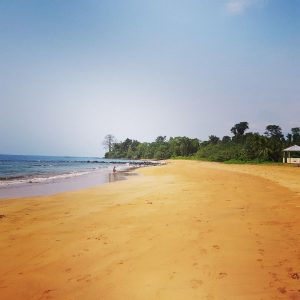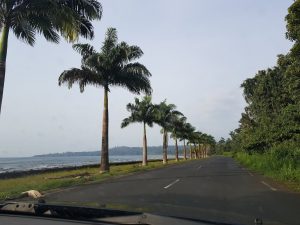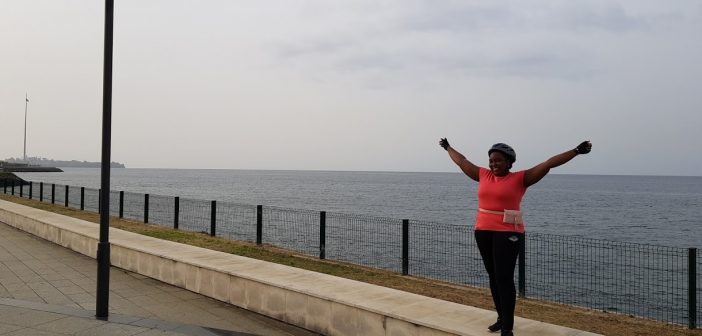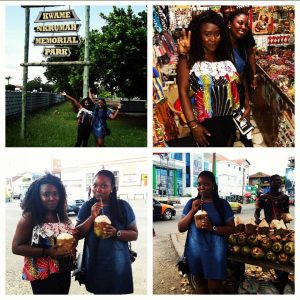 Travel excites me. It’s one of my most passionate adventures. In 2016, I decided I was going to do more African country travels seeing as much of my travel experiences prior to that year had been mainly within Europe.
Travel excites me. It’s one of my most passionate adventures. In 2016, I decided I was going to do more African country travels seeing as much of my travel experiences prior to that year had been mainly within Europe.
Ghana was first up on my “African travel diaries” especially as I had heard quite a lot about the development and advancements in the country. To make it a lot more exciting, I went on this trip with my friend, Nkem and by road. This would give us the opportunity to see other West African border countries of Benin Republic, Togo, Cotonou and the likes while we made the drive down. It took a gruelling 24 hours by road and although I had anticipated the road trip would be fun, our excitement took a downward spiral when Nkem and I discovered our seat were barely an inch away from the restroom on the bus. No one warned us about the dangers of travelling on a luxury bus that only allowed passengers specifically “pee time”. This is a story for another day…
Before I digress, the trip to Ghana was an eye opener. For one I discovered a lot of difference in the economy of Nigeria versus Ghana. The standard of living differed and I guess both governments have different developmental agendas. I did like the fact that there was consistent power supply, loads of tourist attractions and cultural sites to see. Nkem and I visited the Kwame Nkruma memorial park in Accra, the Arts village and we took street tours in Osu enjoying some fresh coconut water drinks popularly sold on the streets of Osu. The 5 day trip in Ghana was fun while it lasted.
Fast forward to year 2017, I moved to Equatorial Guinea in Central Africa where I joined one of the broadband telecoms companies out in Malabo and this was quite the experience. For one, it was a first for me having to face language barriers in an African Country. Equatorial Guinea is the only sovereign African state in which Spanish is an official language. From my experience in movies watching actors of Spanish decent speak English, I had always loved the accent and I hear it’s one of the sexiest languages on earth, so this was something I was looking forward to. No one warned me how difficult it would be learning Spanish though. The first surprise for me was finding out how to pronounce vowels and consonants in Spanish.
Let’s use this as an example. How would you pronounce the word “Calle” if it was an English word? Well you guessed right, you’d probably pronounce it to read as “kale”, yes like the vegetable right? Well in Spanish, it’s pronounced “ka-ye”. The last syllable is pronounced like the ‘ye’ from “Kanye” lol! Calle means ‘street’ in Spanish.
Language wasn’t essentially so much of a shock as my company did use English and speak English for business interactions so this was a lot easier to manage. Let me share with you some of the major culture shocks I experienced upon my move to Malabo. In no particular order…
- Work hours: Nigerians can attest to the fact that there is nothing like “standard” work hour especially within the private sector. On paper, most organisations indicate work hours of 40 – 45 hours per week, 5 days a week, usually from 8am – 5pm. In principle, most employees work well beyond the indicated close of work hours. Most times, this could be a personal decision by the employee especially if they still have piled up deliverable on their desk by close of work, but for some others, it’s just a natural rule of thumb for you to still be at the office well after the close of work because A. “the boss” is still at the office or B. you have to keep up the front of being busy and committed to your job. It’s not in all cases that it will be an ‘a or b’ situation but by now you get the drift. On my first day at the office in Malabo, I did not realise that close of work at 5pm literary meant pack up your stuff and head on home. I was introduced to my team of 12 and after we had gone through the day of getting to know their roles and their schedules and how I would properly manage the team, I had barely gone through my handover notes by 5pm when I heard every one saying ‘adiós” the Spanish word for goodbye. I walk out from my office to the open office to realise that everyone had packed up their bags and where heading out on the dot of 5pm. Aint nobody waiting out that script of “our boss is still in the office”. In-fact, the driver assigned to take me to my apartment after work was so impatient when I told him I would be ready in another 30 minutes. Dude was like; “vamos señora” (meaning leggo Madam!).
- Siesta: I attended a boarding school in high school and then we used to have specific time scheduled for siesta which was usually between 1-2 hours. This time was supposed to be a time to refresh and catch some rest at the end of a long day. Imagine my surprise when I discovered “Siesta” was a thing in Equatorial Guinea. Like nothing happens during Siesta in Malabo which is usually from 1pm – 4pm. The stores would be closed on the dot of 1pm to reopen at 4pm after siesta. Imagine going to Balogun or Tejuosho market in Lagos-Nigeria, only to find it closed because the traders are taking “Siesta”. Like who sleep help? My Nigerian hustlers would have made millions of sales at this time. This probably took me a while to get used to.
- Public holidays: Most private and public sector employees in Nigeria can attest to the fact that public holidays are a major funfair to look forward to. It’s so bad that at the start of every new month, some people already know what holiday would be coming up and how soon. Well, I got the rude awakening moving to Malabo when even for the Easter holidays, I only got the Good Friday off. Like I was at work Saturday and subsequently on Easter Monday. Trust Naija to even throw in an extra day if one of the holidays falls on a weekend. There is no such thing like that in this here Malabo oh… bye to planned sleep scheduled for public holidays…
- Entertainment: I had heard somewhere that most West Africans are the life of the party. Like we can create fun and activity out of anything. Imagine my surprise moving to a very conservative country with little or no room for ginger. Asides from visiting the parks by the seaside and dining out or visiting the beach in Sipopo, you would literally have to cave out your own definition of adventure as aint nobody got time to be organising events and or shows up and dan. To keep the work-life balance, I mostly do work-outs at the gym, cycling at the park and site tours with colleagues whenever we find the time. I particularly liked the visits to Sipopo, Batete and Luba I had made earlier this year on a tour with some colleagues. Equatorial Guinea does have some beautiful places to see.




- Cultural identity: You know how you can tell certain tribes apart in Nigeria by merely looking at the people, eating their food or visiting their cities? Well in Equatorial Guinea, you can’t really place your hand on distinctive cultural norms or traditions. This might be my hasty generalisation, although I have yet to find any counter reference. My first local dinning out was met with a bit of surprise when the sauce I got served with for my rice had little or no pepper. Like how will I just be eating stew without ata rodo? Pepper is usually prepared separate from the meal and placed in saucers to be used at the discretion of the consumer. Like how will you not put pepper in “pepper soup”? Is this not Africa??? I am not understanding… I like how in Ghana, Kente is a major distinctive cultural identity and I think for some other West African States, you can easily find or pick distinctive cultural identifiers (please correct me if I’m wrong).
What are some of your experiences living or working in a different country or continent compared to what you have been used to? Please feel free to share in the comment section. I’d love to read your experiences.
Toodles!






4 Comments
Hahaha! Culture Shock. Everyone needs to experience this at least once in a lifetime. Loved reading this. A lot of things resonate. The ‘Siesta’ (Prayer time here), Work hours (Nigerians are the weird workaholics i see here). Moving from Naija to the middle East as ‘Expat Wife’ has been a major culture (and mental) shock for me. I UNDERESTIMATED it. Pepper Pepper!!! The search for hot pepper. Storing rodo in the freezer for a year! Social life in a totally new context and stereotyping. First two years was a bum. Now i can say it’s grown on me. Its becoming ‘Home’
Great, concise write up you have here!
I can totally relate to your comment Lara. Everyone really needs to experience culture shock as long as its controlled and manageable. Glad you’ve found a way to manage your experience in the Middle East. Thanks for reading! Cheers!
Love it! Addictive piece, welldone Nkechi.
Thanks for binge reading my pieces Chi! 😊